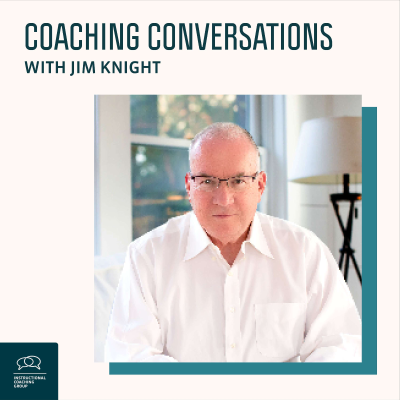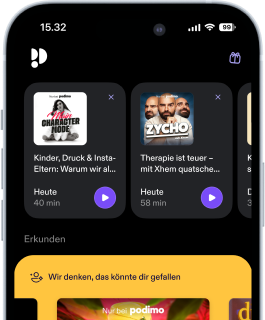
Coaching Conversations with Jim Knight
Podcast von Instructional Coaching Group
Nimm diesen Podcast mit

Mehr als 1 Million Hörer*innen
Du wirst Podimo lieben und damit bist du nicht allein
Mit 4,7 Sternen im App Store bewertet
Alle Folgen
128 FolgenIn this episode of Coaching Conversations, Jessica Wise and I talk about something every coach deals with: time. We know coaching can have a huge impact—but only if coaches actually have time to coach. We dig into the real challenges coaches face when their calendars get filled with everything but coaching. We also share some strategies that have worked for us. This isn’t about squeezing more into the day—it’s about making sure your time reflects your priorities. We hope the episode gets you thinking about your own habits and offers a few tools you can use to stay focused on what matters most. At the end of the day, coaching only works when we give it the time and space to make a difference. Thank you for being a part of our community. * Feedback: We love hearing from you! Leave us a rating or comment to let us know what you think. * Stay Connected: Follow our podcast for more episodes packed with insights and inspiration. Learn more about the Intensive Instructional Coaching Institute: https://www.instructionalcoaching.com/workshop/in-person-intensive-instructional-coaching-institute/ [https://www.instructionalcoaching.com/workshop/in-person-intensive-instructional-coaching-institute/] Learn more about Consulting: https://www.instructionalcoaching.com/instructional-coaching-program/ [https://www.instructionalcoaching.com/instructional-coaching-program/]
In this episode, I’m joined by Sherri Sinclair—an incredible instructional coach, author, and thought partner. Together, we dive into the heart of what great teaching looks like. Sherri brings deep wisdom from her new book, Intentional Instructional Moves, and we talk about what really makes an impact in the classroom: strong classroom management, authentic student engagement, and meaningful assessment for learning. What stands out in Sherri’s approach is how practical and intentional it is—from purposeful group work to clear, focused direct instruction to differentiation that actually works for real classrooms. We also dig into why clarity, connection, and continuous feedback are so essential—not just for student success, but for building learning environments where both teachers and students thrive. If you're a coach, a school leader, or a classroom teacher, you'll walk away from this conversation with real, usable strategies you can start trying tomorrow. Intentionality isn't just a theory—it’s a practice. And Sherri shows us how to do it well. Thank you for being a part of our community. * Feedback: We love hearing from you! Leave us a rating or comment to let us know what you think. * Stay Connected: Follow our podcast for more episodes packed with insights and inspiration. Learn more about PD for Leaders: www.instructionalcoaching.com [https://www.instructionalcoaching.com/] Learn more about the Instructional Coaching Planner: https://shorturl.at/XC1fq [https://shorturl.at/XC1fq]
This week, Jim Knight is joined by special guest, Dr. Marsha Tate to discuss her new book, "Healthy Teachers, Happy Classrooms." Dr. Tate shares insights on how joy, movement, music, and meaningful relationships are essential for both teachers and students. She highlights strategies for creating soothing environments, promoting healthy habits, and fostering positive emotions in schools. The conversation emphasizes the importance of well-being and purpose in education, offering practical advice to help educators restore passion and optimism. Thank you for being a part of our community. * Feedback: We love hearing from you! Leave us a rating or comment to let us know what you think. * Stay Connected: Follow our podcast for more episodes packed with insights and inspiration. Learn more about the Intensive Instructional Coaching Institute: https://shorturl.at/Kc9j2 [https://shorturl.at/Kc9j2] Learn more about TLC 2025: https://shorturl.at/Kc9j2 [https://shorturl.at/Kc9j2]
In this episode, I had the pleasure of speaking with Maggie Jackson, the brilliant author of Uncertain. Our conversation dove deep into a theme that resonates powerfully with me—especially in the context of instructional coaching: the importance of embracing uncertainty. Maggie makes a compelling case that, although many of us instinctively reach for certainty like a security blanket, that same certainty can often box us in. It can lead to rigid thinking, stifle our creativity, and close us off from new possibilities. Instead, she invites us to view uncertainty not as a threat, but as a catalyst for growth. When we open ourselves up to the unknown, we unlock our capacity for curiosity, resilience, and adaptability. We also touched on some fascinating neuroscience—specifically, how our brains are wired to avoid ambiguity, and how that natural resistance can actually hold us back. Maggie introduces the idea of adaptive expertise, which is all about our ability to learn, unlearn, and relearn in response to new and complex situations. This idea couldn’t be more relevant to the work we do as instructional coaches. Thank you for being a part of our community. Feedback: We love hearing from you! Leave us a rating or comment to let us know what you think. Stay Connected: Follow our podcast for more episodes packed with insights and inspiration. Learn more about Radical Learners: www.radicallearners.com
In this episode of the Coaching Conversations podcast, I had the pleasure of sitting down with Jessica Wise to explore what I call the Seven Success Factors for effective instructional coaching. These factors come from years of research and practice, and they represent what I've seen work in real schools with real teachers. Jessica and I talked about the importance of approaching coaching as a partnership, where both coach and teacher learn from each other. We also dug into how crucial it is to use data—not just to measure success, but to guide our decisions in a way that truly supports student learning. Throughout the conversation, we kept coming back to one central idea: coaching must be rooted in empathy, trust, and a relentless focus on student outcomes. We talked about how leadership can make or break coaching programs, and why a supportive culture is essential if we want teachers to grow. Teaching is deeply personal work, and coaching needs to honor that by being compassionate, collaborative, and always grounded in respect. Access the "Teach to Win" [https://www.instructionalcoaching.com/wp-content/uploads/2024/08/64763519707f6a507aaf18d5_Teach-to-Win_JimKnight_reducedsize.pdf] article referenced in this podcast. Thank you for being a part of our community. * Feedback: We love hearing from you! Leave us a rating or comment to let us know what you think. * Stay Connected: Follow our podcast for more episodes packed with insights and inspiration. Learn more about The Impact Cycle: https://www.instructionalcoaching.com/workshop/the-impact-cycle/ [https://www.instructionalcoaching.com/workshop/the-impact-cycle/] Learn more about Consulting: https://www.instructionalcoaching.com/instructional-coaching-program/ [https://www.instructionalcoaching.com/instructional-coaching-program/]























